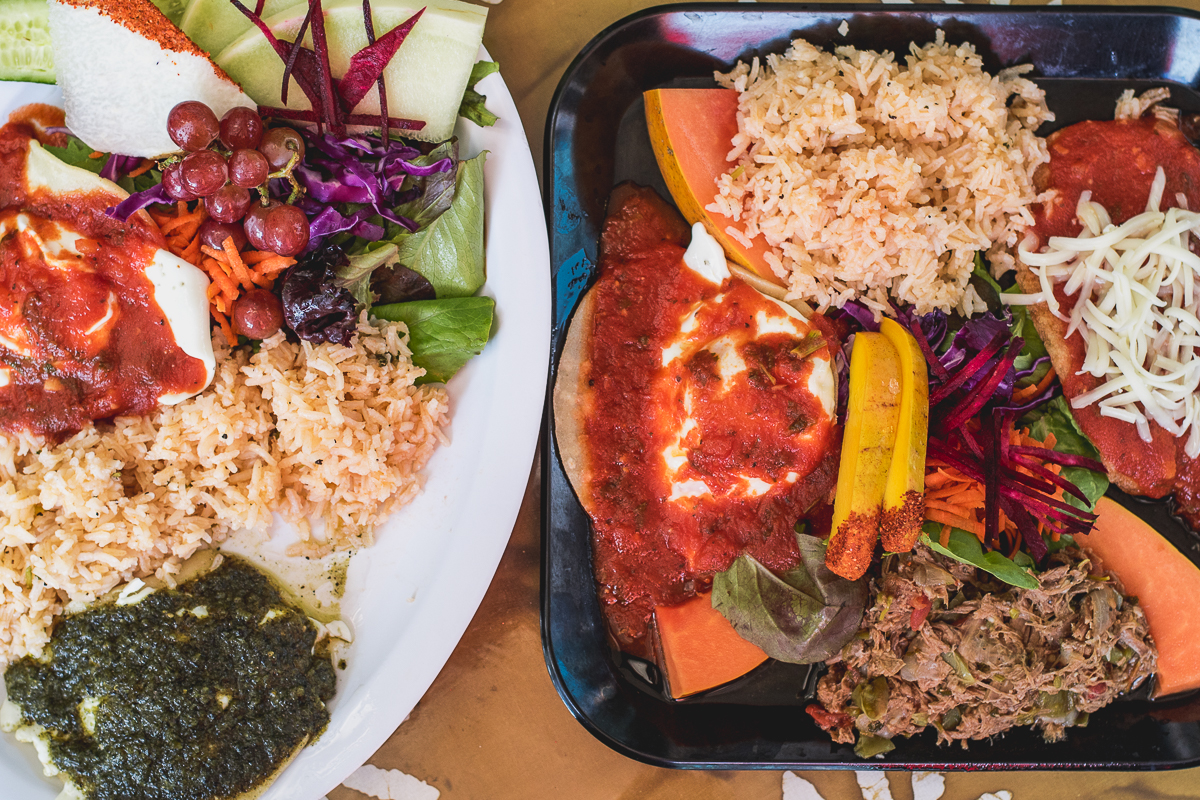
Tucson has been a beer town since the aptly-named Pioneer Brewery opened in 1864.
The area’s vineyards have been one of Arizona’s best-kept secrets, surprising visitors and even locals who assume you can’t make wine here. And that’s one of the problems facing the new wave of Southern Arizona distillers, thinks Stephen Paul, the founder of Hamilton Distillers when asked about the challenges facing distillers in and around Tucson.
“The main challenge is not the distilling but the marketing of our whiskeys, because of a now-outdated perception that bad wines come out of Arizona,” Paul said. “We’re pretty much over the initial hurdle, but early on we’d get people tasting our stuff who were predisposed to think it was going to be bad, but then come out with, oh, that’s actually good!”
Hamilton’s first three spirits went on sale in 2013, but their story goes back to 2006. At that time, Stephen Paul was running his furniture company, Arroyo Design, specializing in making furniture out of mesquite wood. An idea popped into his head — why couldn’t you make whiskey by malting barley over mesquite wood instead of peat, as they do in Scotland? The desire to make a Sonoran Desert single-malt was there, and the thought wouldn’t go away.
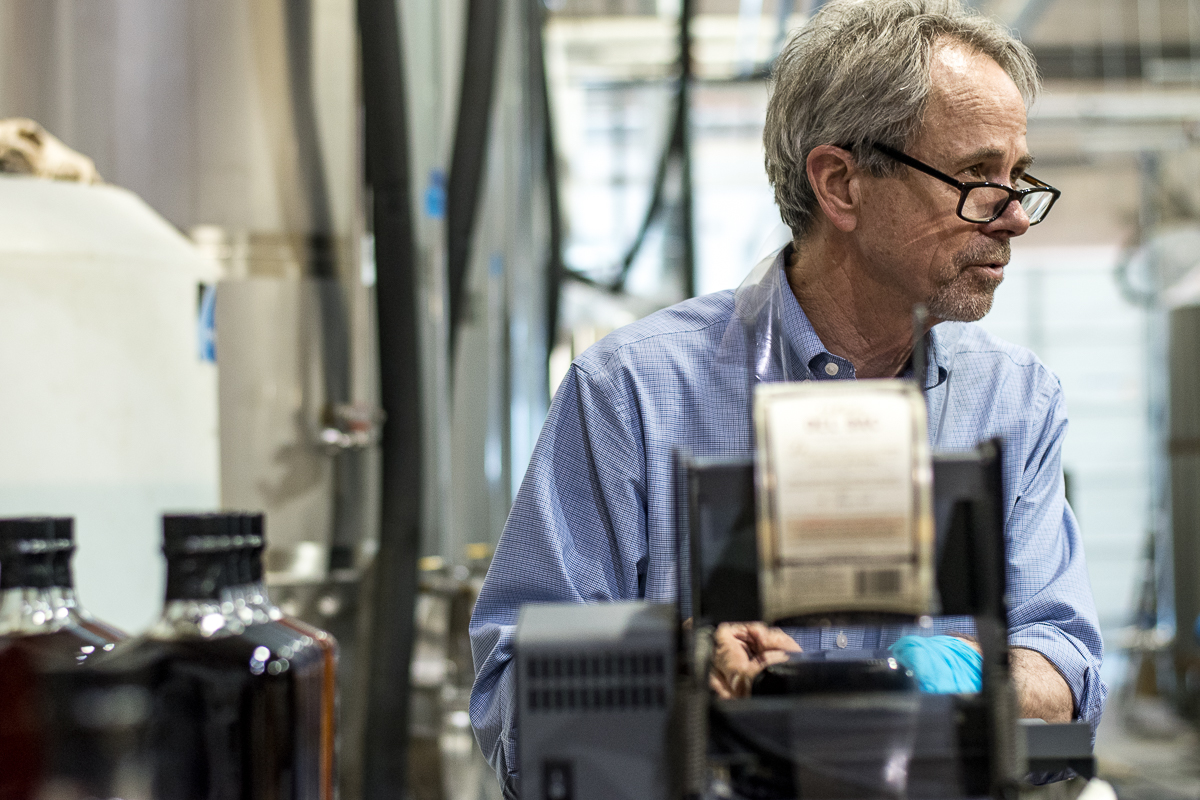
“In early 2007, I got a little five-gallon still from Portugal and started learning how to make whiskey,” Paul said. “The still was so small the distillate would just drip out. It took forever to fill even a little one-gallon barrel. Once, I brought the heat up too fast and the top blew off along with the boiling liquid. I narrowly escaped a major burn that time. Learning how to malt barley and making a real single-malt whiskey came later.”
A decade later with national accolades under their belt, Hamilton has established themselves as a local go-to whiskey for both fancy cocktails and Eegee’s cocktails.
For more information, visit hamiltondistillers.com.
About the time Paul was taking his first steps in distilling, Mark Beres was retiring from his job as a Special Forces pilot and moving to Tucson to work for the aerospace company, Raytheon. He’d been buddies with Marc Moeller since the two met in parachute school. Moeller rose to become a training pilot on Air Force Two, the plane that carries the Vice President and other dignitaries.
“I was responsible for flying people like Clinton, Cheney, Biden, Condoleezza Rice,” Moeller said. He retired in 2011, and along the way Beres and Moeller became close friends with another pilot, Tom Kitchens.
By this time Beres had fallen in love with the Arizona wine industry and thought about opening a vineyard.
“When he told me about it, I told him not to open one of those hobby vineyards.” Moeller said. “If we do this, we do it as a proper business, we do the research, we draw up a business plan.”
When they told their third buddy, Kitchens, about the idea his response was less than enthusiastic.
“What?” Kitchen said. “A vineyard in the desert?”
The three friends did their research, though, drew up business plans, studied wineries in Napa Valley, and by 2013 had opened Flying Leap Vineyards in Elgin, their vineyard in the desert. Soon after, Moeller went to Kentucky to learn the skills of distilling and they began making spirits from their own grapes.
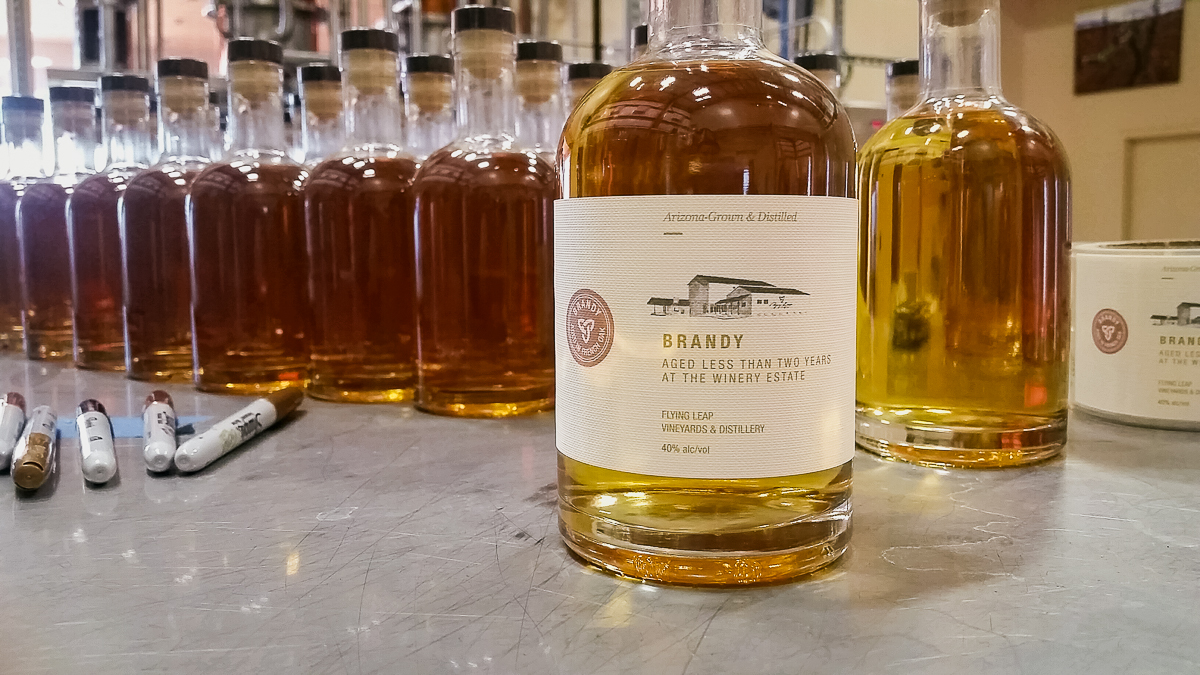
“The run that I’ll always remember is Flying Leap’s first stripping run from our first fermentation of our 2016 wines,” Moeller said. “We loaded the finished wine including skins into our pot still and about an hour later we were collecting our first ‘low wines,’ reveling in the significance of being one of the only distilleries in Arizona to forge new ground in distilling from grapes from our own vineyards.”
It was far from plain sailing, though.
“Distilling within any city limits presents issues that can eventually be overcome through great effort working with regulatory agencies,” Moller said. “Even though Flying Leap’s production facilities lie outside of Tucson proper, we had a great many hoops to jump through over more than two years before we could begin distilling. In general, the business climate in SW Arizona is not optimal. Governments, regardless of level (local, county or state), typically focus on an ‘us versus them’ mentality rather than working with smaller businesses in their charge to create win-win situations. It’s really quite shocking considering that businesses are what fuel the government’s tax coffers and provide salaries to employees.”
The distillery has expanded significantly and now includes a 1,500-liter still and large cooling system.
This is an eco-friendly move as the cooling system reuses cooling water (which distilleries use in large quantities) from the distillery, eliminating wastewater entirely.
In order to honor the desert climate and preserve its groundwater supply, Flying Leap has “invested in a comprehensive chilling and water regeneration and recirculating system that has virtually eliminated our wastewater effluent to a trickle”.
Stills are controlled (throttled) using heat, and a continuous but varying flow of cold water is used to cool stills. In the case of Flying Leap, this flow of cooling water is recovered rather than dumped, then force-chilled and recirculated back to cool again.
For more information, visit flyingleapvineyards.com.
Moller’s view is shared by Don Northrup of the Independent Distillery.
“As such a new industry in the state, let alone county and city, we had to define what a craft distillery actually was,” Northrup said. “This meant the creation of an entirely new license for the state. This obviously led to many other unique challenges. Zoning or the lack thereof for our industry’s new license now existed, but where it could be operated out of was still undecided — all the while convincing our city leaders that we wouldn’t blow up downtown.”
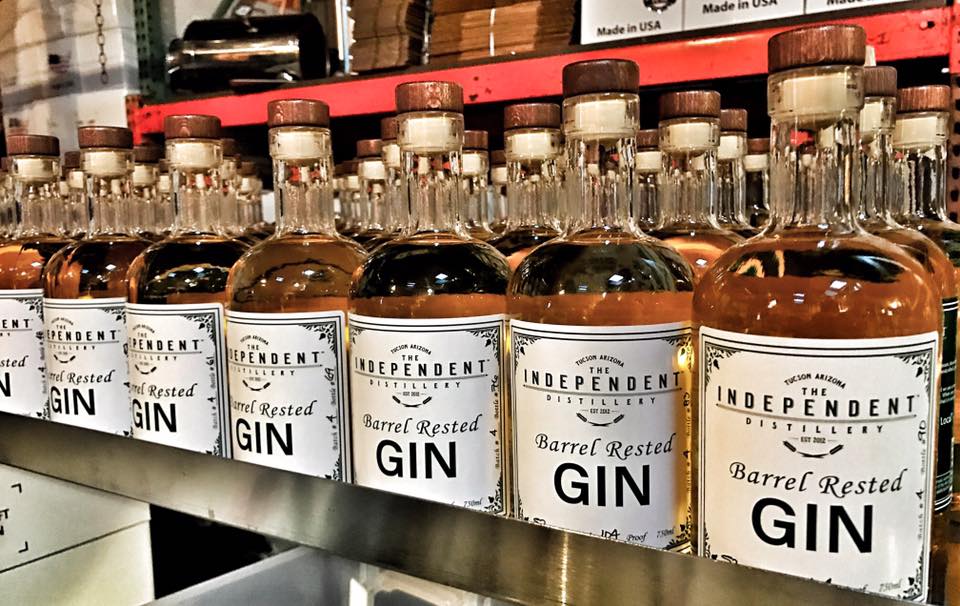
Northrup is also ex-military, and that’s where he got his first interest in distilling.
“When I was in the service and stationed in San Diego in the late eighties and early nineties, one of my housemates was from rural West Virginia,” Northrup said. “His grandpa would send out mason jars full of shine. He would open the jar and pour out a small amount and light it on fire. He would say, ‘Don’t drink it if it burns yellow, but if that flame is blue you’ve got yourself some fine moonshine, feller!’ Or at least that’s how I want to remember it […] That’s probably when the first thoughts started to creep.”
For more information, visit theindependentdistillery.com.
For a definition of local that expands into Arizona beyond Tucson, Elgin Distillery also offers a bourbon. Committed to using local ingredients, Elgin Distillery has been honored several times at the New York International Spirits Competition, including Arizona Whiskey Distillery of the Year in 2016 and Arizona Distillery of the Year in 2017.
Elgin uses sugar cane from Sonora Mexico for its rum and, amongst other local ingredients, Arizona-grown rye for its Arizona Rye Whiskey.
“We use local ingredients to showcase Arizona,” said distillery co-founder Gary Ellam, “even though we know it’s more costly to do this.”
So, other than good local ingredients, what do you need to produce award-winning spirits, as Elgin has done time and time again?
“Firstly, and I believe most importantly, is the water,” said Ellam. “You must have a great source for water in order to make great spirits. Secondly, different still types and configurations are best suited for different spirits. This is why we have multiple stills. Lastly, you must have passion, but knowledge and science are also required.”
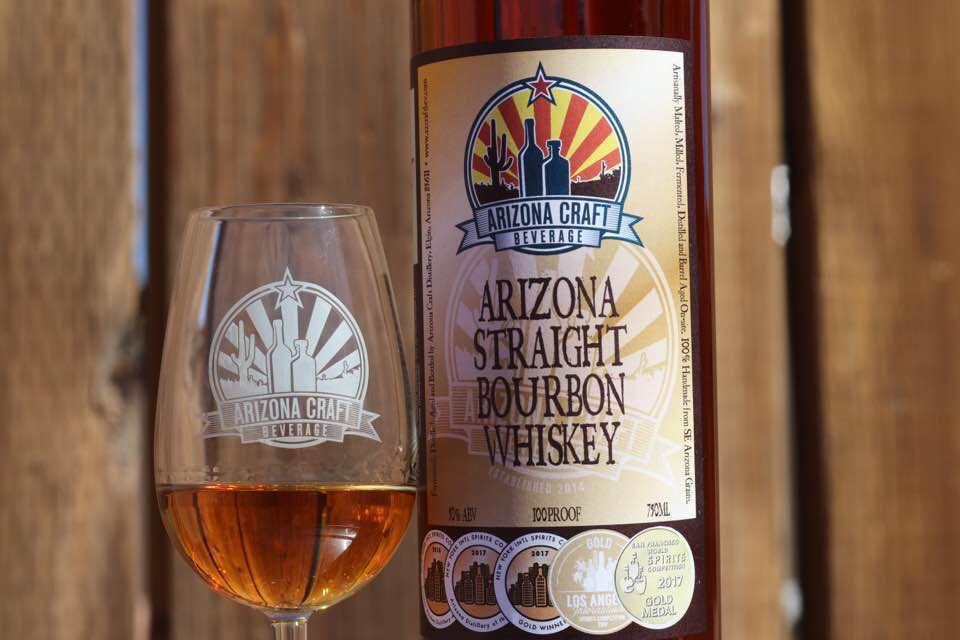
Ellam and his business partner Steve Murray grew up around stills, Ellam on the legal side and Murray in the Kentucky backwoods. They have just under 100 years of distilling experience between them, which is one reason they’ve become known as a top bourbon producer.
“We take great care to nurture the spirits into fine, balanced and well-rounded products worthy of bottling,” Ellam said. “Our bourbon whiskies have received numerous gold medals at the major international competitions and garnered us international recognition as a whiskey house.”
Ellam also harked back to the problem of simply getting the word out. When asked what was the most challenging thing about making spirits in Tucson, he said, “currently, the biggest drawback is getting the public educated on the fact that southern Arizona produces and has a number of excellent distilleries and distilled spirits products.”
The Elgin Distillery team is also working on bringing a Tucson distillery to life: Old Pueblo Distilling. Keep up with Arizona Craft Beverage on Facebook for updates.
Since the article came out we have won the BEST RUM IN THE WORLD back to back, 2018 and 2019, at the World Spirits Competition in San Francisco. In addition, we won BEST IN SHOW at the AMERICAN CRAFT SPIRITS AWARDS and the WORLD SPIRITS COMPETITION. All for our REGALO DE VIDA RUM. We received a total of 20 major international gold or better medals for our ARIZONA STRAIGHT BOURBON WHISKEY and our EL GIN won a Silver Outstanding and Gold medals at the Gin Masters competition at the International Wine and Spirits Competition in London and the World Spirits Competition in San Francisco respectively. We have also produced the first roasted agave spirit in Arizona since 1938.
Also, we were selected as the 3rd place Craft Rum Distillery in the USA Today Top 10 readers poll last year
For more information, visit azcraftbev.com.
Stephen Paul, Hamilton Distillers: “The fact that we created a product that had never been made before in our mesquite-smoked Dorado is something I’m super proud of. The national recognition it’s received has been a lot of fun.”
Marc Moeller, Flying Leap: “It’s still too early to tell but we are very proud of the progress of our aging brandies. Premium quality barrel-aged spirits take time to mature. Check back with us in about a year!”
Don Northrup, the Independent Distillery: “I couldn’t pick one as a favorite. But the decision to put out a barreled gin was something I had been thinking about for some time, maybe 10 years or more. When it finally came time to execute there was actually some serious internal pushback at first. But sometimes you need to stand by your ideas. So we refocused our process, stuck to our original vision and ended up with a double gold winner in its class right out of the gate. Now it just continues to improve and refine as we grow.”
Gary Ellam, Elgin Distillery: “We are proud of each and every spirit we produce.”
[This article was originally written on February 22, 2018, and most recently updated on Feb 12, 2020.]